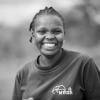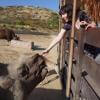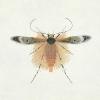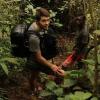Camera traps have been a key part of the conservation toolkit for decades. Remotely triggered video or still cameras allow researchers and managers to monitor cryptic species, survey populations, and support enforcement responses by documenting illegal activities. Increasingly, machine learning is being implemented to automate the processing of data generated by camera traps.
A recent study published showed that, despite being well-established and widely used tools in conservation, progress in the development of camera traps has plateaued since the emergence of the modern model in the mid-2000s, leaving users struggling with many of the same issues they faced a decade ago. That manufacturer ratings have not improved over time, despite technological advancements, demonstrates the need for a new generation of innovative conservation camera traps. Join this group and explore existing efforts, established needs, and what next-generation camera traps might look like - including the integration of AI for data processing through initiatives like Wildlife Insights and Wild Me.
Group Highlights:
Our past Tech Tutors seasons featured multiple episodes for experienced and new camera trappers. How Do I Repair My Camera Traps? featured WILDLABS members Laure Joanny, Alistair Stewart, and Rob Appleby and featured many troubleshooting and DIY resources for common issues.
For camera trap users looking to incorporate machine learning into the data analysis process, Sara Beery's How do I get started using machine learning for my camera traps? is an incredible resource discussing the user-friendly tool MegaDetector.
And for those who are new to camera trapping, Marcella Kelly's How do I choose the right camera trap(s) based on interests, goals, and species? will help you make important decisions based on factors like species, environment, power, durability, and more.
Finally, for an in-depth conversation on camera trap hardware and software, check out the Camera Traps Virtual Meetup featuring Sara Beery, Roland Kays, and Sam Seccombe.
And while you're here, be sure to stop by the camera trap community's collaborative troubleshooting data bank, where we're compiling common problems with the goal of creating a consistent place to exchange tips and tricks!
Header photo: Stephanie O'Donnell
No showcases have been added to this group yet.

- 1 Resources
- 5 Discussions
- 9 Groups
R&D lead @ enlaps


- 0 Resources
- 6 Discussions
- 2 Groups
- @AllySabur
- | Mr
"Founder of Worker Bees Africa, advancing bee conservation through innovation."
- 0 Resources
- 0 Discussions
- 3 Groups
- @Harsha
- | He/Him
I am a marine biologist / acoustic ecologist from Australia. Fascinated by bioacoustics, I always look forward to learning from people in conservation!
- 0 Resources
- 0 Discussions
- 11 Groups
Alberta Biodiversity Monitoring Institute (ABMI) & SENSR
We track changes in wildlife and their habitats in Alberta, working collaboratively to provide ongoing, relevant, scientifically credible information.


- 2 Resources
- 0 Discussions
- 4 Groups
- @Adwait
- | He
Postdoc at Max Planck Institute of Animal Behaviour
- 0 Resources
- 0 Discussions
- 4 Groups
Holder of BSc in Applied Zoology. Assistant Ecologist at Ruaha National park.


- 0 Resources
- 7 Discussions
- 12 Groups
University of Zurich
PhD student at the University of Zürich (CH) in PopEcol group, working with camera traps and mammals
- 0 Resources
- 0 Discussions
- 8 Groups
World Wide Fund for Nature/ World Wildlife Fund (WWF)
- 0 Resources
- 2 Discussions
- 5 Groups
- 0 Resources
- 0 Discussions
- 5 Groups
- @sroilo
- | she/her
- 0 Resources
- 0 Discussions
- 4 Groups
- @nabilla.nuril
- | She/Her
University College London (UCL)
- 0 Resources
- 0 Discussions
- 11 Groups
Forbes feature comparing five trail cameras.
26 April 2023
Quick feature of Virgina Tech project using camera traps and biologgers to track bobcats, collecting data to inform human-wildlife coexistance efforts
26 April 2023
New paper in Methods in Ecology and Evolution
24 March 2023
💙 Exciting news from Appsilon! Our flagship project, Mbaza AI, is expanding its impact on nature and biodiversity conservation. We’ve teamed up with the 🦏 Ol Pejeta Conservancy to build a model for classifying images of...
16 March 2023
The Innovation in Practice edition of Methods in Ecology and Evolution is still seeking proposals about conservation technology
6 March 2023
Interesting article that links to research on how technology has made studying moose populations easier, with particularly good explanation of what makes moose populations difficult to track.
22 February 2023
Are you looking to use camera traps in your conservation project? Check out this starter tutorial from Ol Pejeta's Kennedy Muriithi - he'll walk you through everything you need to know about getting started with camera...
22 February 2023
New technology enabling the automated monitoring of moths has been put to rigorous testing in tropical conditions in Panama by an international team of researchers
22 February 2023
Technology to End the Sixth Mass Extinction. Salary: $104k-144K; Location: Washington DC or Seattle WA, potential hybrid; 5+ years of Full stack development experience; Deadline March 15th - view post for full job...
10 February 2023
Are you excited by the potential for new technologies to help monitor the natural world? Do you enjoy communicating your passion for technology and nature with diverse audiences? We are seeking an enthusiastic...
2 February 2023
Consultancy opportunity at ZSL for an experienced monitoring specialist to support species monitoring in rewilding landscapes across Europe
31 January 2023
August 2025
event
event
September 2025
event
event
event
April 2023
February 2023
58 Products
Recently updated products
4 Products
Recently updated products
| Description | Activity | Replies | Groups | Updated |
|---|---|---|---|---|
| Have a look at @tessa_rhinehart 's TechTutors on scaling up acoustic surveys. This is addressed at 11 min: The "hexadecapus" is the hardware, but transfer is automated by... |
|
Camera Traps, Data management and processing tools | 2 years 10 months ago | |
| My most prized camera trap image - a hummingbird caught on camera! |
|
Autonomous Camera Traps for Insects, Camera Traps | 2 years 10 months ago | |
| I would agree that primates probably aren't your biggest concern, animal-destroyer wise. At least in the Malagasy rainforests, lemurs are highly arboreal so if you have trail cams... |
|
Camera Traps | 2 years 10 months ago | |
| Thanks so much!! |
|
Acoustics, AI for Conservation, Animal Movement, Camera Traps, Community Base, Data management and processing tools, Drones, eDNA & Genomics, Emerging Tech, Open Source Solutions, Geospatial, Software Development | 2 years 10 months ago | |
| There is this other WILDLABS discussion thread where tons of people provided input on their experiences with lots of different brands & models which may help. You might... |
|
Camera Traps | 2 years 10 months ago | |
| Done lots of this over the years and it depends on the species really. If you want incubation behaviour and hence success or otherwise using temperature then the Thermocron... |
|
Animal Movement, Sensors, Build Your Own Data Logger Community, Camera Traps | 2 years 10 months ago | |
| Might be good to add this to the 'Automated Camera Traps for Insects' group |
|
Camera Traps, Autonomous Camera Traps for Insects | 2 years 10 months ago | |
| Good information, Thank you! |
|
Camera Traps | 2 years 11 months ago | |
| Wifi SD cards exist https://www.amazon.ca/s?k=wifi+sd+card&crid=3HDWHASJGRU8X&sprefix=wifi+sd%2Caps%2C148&ref=nb_sb_ss_ts-doa-p_2_7Never tried them personally... |
|
Camera Traps | 2 years 11 months ago | |
| Hi Kim,Thanks for the response. I think they can hear our cameras clicking when they are set off and they come to see what is happening so I would totally agree with the... |
|
Camera Traps | 3 years ago | |
| Hi Yvan,If you find something which reaches your expectation and especially the ability to identify individual with plumage patterns I will be intereted.In the same idea that... |
|
AI for Conservation, Camera Traps | 3 years ago | |
| I'm interested in your findings for the same utilization, so what did you decide to do ? |
|
Camera Traps | 3 years ago |














































